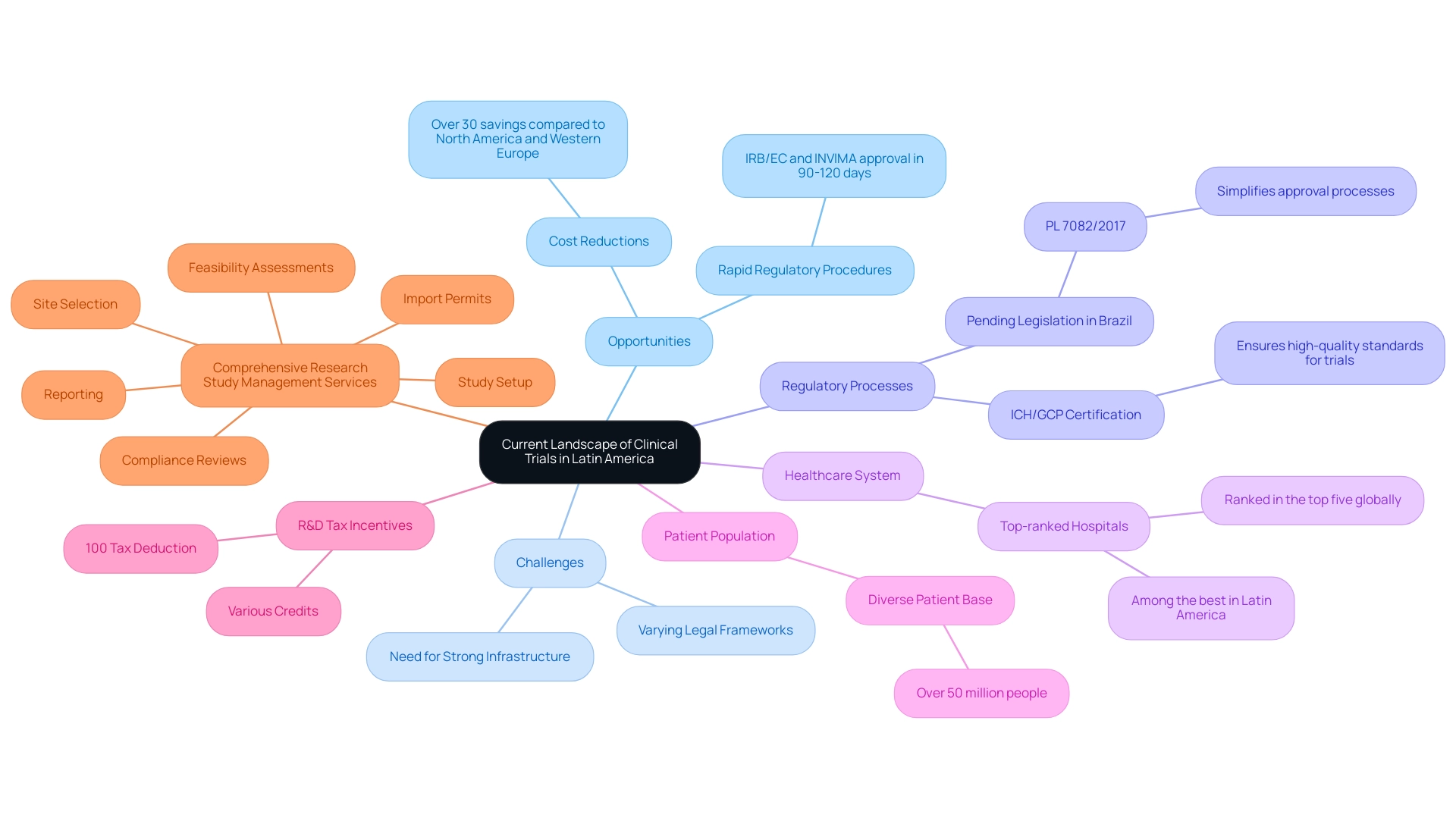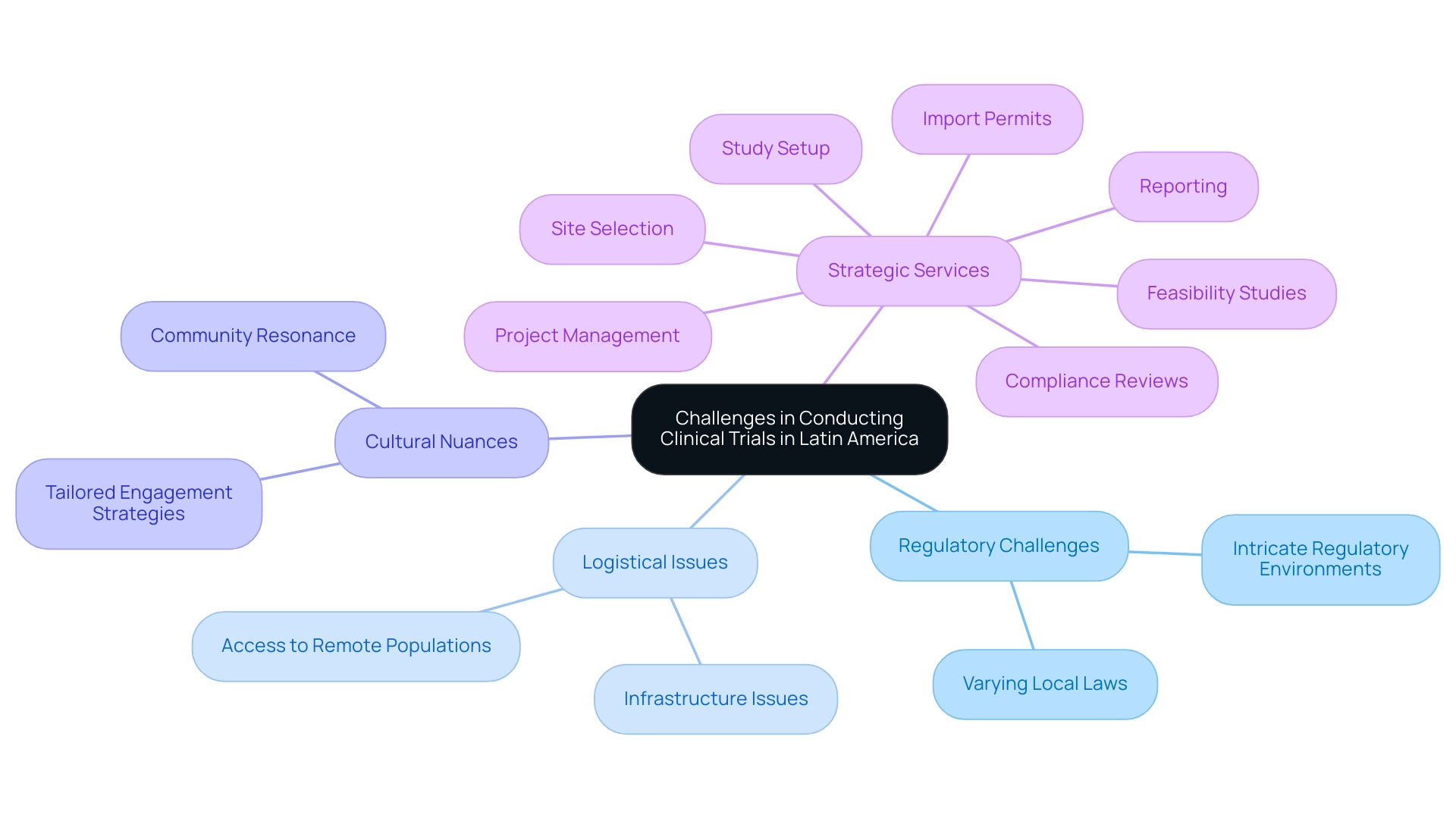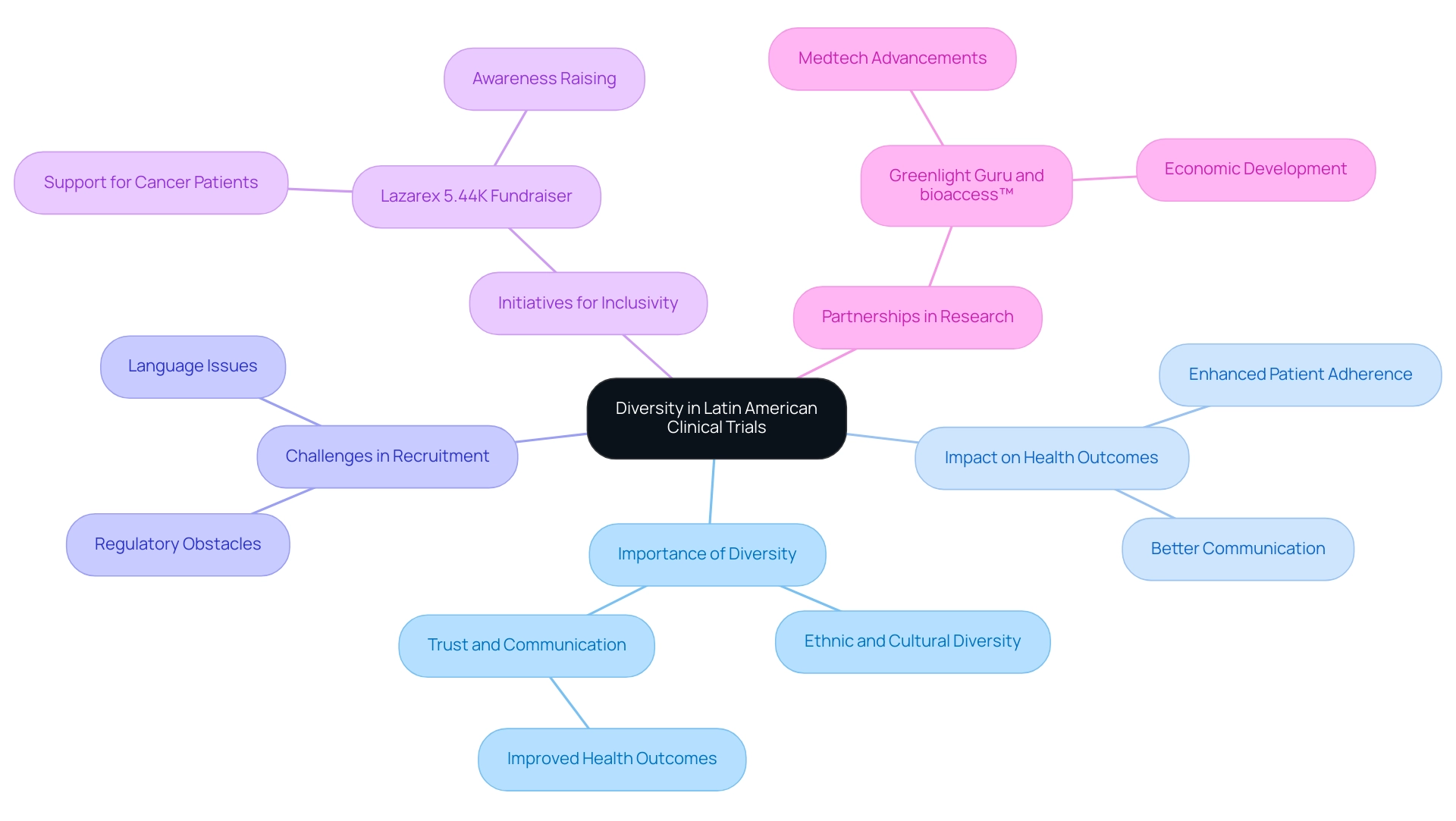Overview
The article focuses on the challenges and opportunities in conducting clinical trials in Latin America, particularly emphasizing the advantages offered by countries like Colombia, such as cost reductions and rapid regulatory processes. It supports this by detailing the region's diverse patient population, ongoing improvements in infrastructure, and the increasing adoption of decentralized clinical trials, which collectively enhance recruitment and data collection while addressing logistical and regulatory hurdles.
Introduction
The clinical trials landscape in Latin America is undergoing a transformative shift, characterized by rapid growth and a wealth of opportunities for pharmaceutical and research organizations. At the forefront of this evolution is Colombia, a nation distinguished by its competitive advantages in conducting first-in-human trials. With significant cost savings and expedited regulatory processes, Colombia emerges as a prime location for clinical research.
However, alongside these advantages lie a series of challenges, including inconsistent regulatory environments and logistical hurdles that must be navigated effectively. As the region embraces innovative methodologies such as decentralized clinical trials and prioritizes diversity in participant demographics, the potential for enhancing patient outcomes and advancing medical knowledge becomes increasingly evident.
This article delves into the current dynamics of clinical trials in Latin America, exploring both the opportunities and challenges that define this critical sector.
Current Landscape of Clinical Trials in Latin America
The medical studies environment in Latin America is undergoing remarkable expansion, highlighting the Challenges and Opportunities in Latin American Clinical Trials for pharmaceutical firms and investigative organizations, especially in Colombia. The nation is distinguished for its competitive benefits in first-in-human trials, providing cost reductions of more than 30% in comparison to North America and Western Europe, along with rapid regulatory procedures—IRB/EC and INVIMA endorsement usually requiring just 90-120 days. Additionally, Colombia's healthcare system is highly regarded, with hospitals ranking among the best in Latin America and classified within the top five globally by International Living.
Hospitals in Colombia must undergo a rigorous ICH/GCP certification process to conduct clinical trials, ensuring high-quality standards. The large and diverse patient population, over 50 million, facilitates effective recruitment and data collection, further enhancing Colombia's attractiveness as a research site. Moreover, R&D tax incentives, such as a 100% tax deduction and various credits, offer significant financial advantages for carrying out studies in the country.
However, stakeholders must navigate the challenges and opportunities in Latin American clinical trials, such as varying legal frameworks across different countries and the need for strong infrastructure to support testing operations. As Mirella Nardo highlights, pending legislation in Brazil (PL 7082/2017) could signify notable advancements for research, simplifying approval processes. Understanding these dynamics is crucial for optimizing recruitment strategies, project management, and ensuring compliance within the region.
Comprehensive research study management services, including:
- feasibility assessments
- site selection
- compliance reviews
- study setup
- import permits
- reporting
play a pivotal role in addressing the operational aspects vital for successful execution.

Challenges in Conducting Clinical Trials in Latin America
Clinical studies in Latin America present challenges and opportunities in Latin American clinical trials, particularly due to intricate regulatory environments that vary significantly across nations. Successfully navigating these regulations requires a thorough understanding of local laws and guidelines, as regulations can vary not only by country but also within regions. Additionally, logistical issues, such as insufficient infrastructure and limited access to remote populations, present substantial hurdles for patient recruitment and retention.
To tackle these logistical challenges, initiatives such as those from Colombia's government seek to improve infrastructure and enable better access for various populations, thus drawing more than 100 new research studies each year, anticipated to produce around $500 million in economic benefits. Cultural nuances further complicate participation, necessitating tailored engagement strategies that resonate with varied communities. Experts observe that overcoming the challenges and opportunities in Latin American clinical trials is essential for nurturing a strong medical investigation environment in the region.
As Nuray Kenzhebek, Marketing Director at Cyberdise, noted, 'Latin America’s expanding role in FDA-regulated studies emphasizes a wider trend: the globalization of medical research, which underscores the challenges and opportunities in Latin American clinical trials,' highlighting the urgency of tackling these challenges. With the research studies market projected to reach USD 159.29 billion by 2032, optimizing strategies in comprehensive research management services—including:
- feasibility studies
- site selection
- compliance reviews
- study setup
- import permits
- project management
- reporting
is essential for capitalizing on potential growth and economic benefits. These services not only simplify the regulatory process but also boost the overall efficiency of research studies, directly aiding in better patient recruitment and retention results.

Emerging Opportunities: Decentralized Clinical Trials and Patient-Centric Approaches
The rise of decentralized studies (DCTs) signifies a crucial change that highlights the challenges and opportunities in Latin American clinical trials, ultimately improving medical research across the region. By harnessing advanced technology for remote patient monitoring and data collection, DCTs significantly alleviate the travel burden on participants. A recent study indicates that DCTs are projected to increase patient recruitment rates by 30% in 2024, showcasing their growing importance.
This patient-focused strategy not only enhances recruitment and retention rates but also promotes more varied and representative study groups, aligning with the objectives of thorough research management services such as those offered by bioaccess®. Essential aspects of our services encompass:
- Careful setup
- Start-up procedures
- Compliance with approvals from ethics committees and health ministries
Furthermore, we ensure robust reporting mechanisms that cover:
- Study status
- Inventory
- Both serious and non-serious adverse events
As healthcare systems throughout the area progressively incorporate telemedicine and digital health solutions, the practicality of adopting decentralized studies is reflecting the challenges and opportunities in Latin American clinical trials, transforming the medical investigation landscape. Karen Noonan, senior vice president of global compliance policy at the Association of Clinical Research Organizations (ACRO), observes, 'Regulators are very receptive to DCTs, but they want to understand our reasoning for why the inclusion of a specific DCT element is logical in this specific study.' This viewpoint emphasizes the significance of adjusting research methodologies to satisfy both compliance standards and patient requirements in a swiftly changing environment.
Moreover, a case study titled 'Progress in Diversity within Pharmaceutical Companies' emphasizes the effectiveness of diversity initiatives in the industry, revealing that companies with a Chief Diversity Officer have observed a 15% increase in varied participant populations. Moreover, comprehending the governing structure set by INVIMA, a Level 4 health authority acknowledged by PAHO/WHO, is vital for guaranteeing adherence in research studies. It is also essential to note that registration for new accounts is currently disabled, which may affect regulatory compliance and the overall environment of medical studies.
The Importance of Diversity in Latin American Clinical Trials
Variety in studies is crucial for guaranteeing that findings are pertinent and usable across different groups. Latin America, with its rich mosaic of ethnic, cultural, and socioeconomic diversity, must reflect this variety in the demographics of research participants. Research indicates that when Black patients engage with Black healthcare providers, it significantly enhances communication, trust, adherence to medical advice, and ultimately, health outcomes.
This highlights the necessity of inclusive research practices, which not only enhance the validity of study results but also foster trust within diverse communities. Significantly, in 2023, the average enrollment of Black patients in five Johnson & Johnson multiple myeloma studies was more than twice the historical industry standard, emphasizing the critical need for diverse involvement in medical research.
To enhance recruitment and participation in Latin America, researchers must implement targeted strategies that address the challenges and opportunities in Latin American clinical trials faced by underrepresented populations, including regulatory obstacles and language issues that Medtech companies often encounter in the region. Comprehensive research project management services, including feasibility studies, site selection, compliance reviews, study setup, import permits, project management, and reporting, are crucial in this regard. Recent data from the NIH All of Us Research Program reinforces that inclusivity leads to more comprehensive and applicable findings.
Moreover, initiatives like the Lazarex 5.44K Fundraiser Event not only assist the Lazarex Cancer Foundation’s mission but also act as efficient methods for raising awareness and financing for cancer patients, thus improving recruitment efforts.
The media coverage by Clinical Leader concerning research studies in Latin America and Colombia further highlights the significance of these initiatives and their effect on local economies. By prioritizing demographic diversity and adopting inclusive research methods in Latin American studies, researchers can significantly enhance the overall quality and relevance of their work, thus addressing the challenges and opportunities in Latin American clinical trials. This commitment fulfills ethical responsibilities and paves the way for advancements that benefit all populations.
Furthermore, the partnership between Greenlight Guru and bioaccess™ further speeds up Medtech advancements and research in the area, highlighting the potential for economic development and healthcare enhancement through these studies. It is important to note that Teva Pharmaceuticals is not responsible for the accuracy of information on third-party websites, which emphasizes the importance of diligence in sourcing information.

Future Perspectives: Enhancing Clinical Trial Infrastructure and Collaboration
Looking ahead, improving the research framework and promoting cooperation among stakeholders will be essential for addressing the challenges and opportunities in Latin American clinical trials. With Argentina's urban populace accounting for 92% of the overall population as of 2017, there is a substantial demographic foundation that can aid in medical study initiatives. Funding in development centers, training initiatives, and compliance alignment can greatly improve testing efficiency.
Colombia's healthcare system, acknowledged for its strong Level-4 oversight agency INVIMA, serves as a prime illustration of how a well-organized governance framework can draw international studies, increasing the number of medical investigations carried out in the nation. The Colombian administration is diligently striving to enhance the medical investigation atmosphere to align with global benchmarks, anticipated to lead to a rise in medical studies. Moreover, the persistent legal challenges, such as the problem of cannabis herb, plants, and seeds confiscations in Latin America, highlight the challenges and opportunities in Latin American clinical trials, emphasizing the necessity for a supportive setting for research.
Building strategic partnerships between academic institutions, healthcare providers, and industry sponsors is essential for facilitating knowledge sharing and optimizing resources. Companies like bioaccess® are at the forefront, offering extensive research management services, including feasibility studies, site selection, compliance reviews, setup, import permits, and project management, thereby facilitating the advancement of medical devices in this region. Moreover, bioaccess® plays an essential part in addressing compliance challenges, ensuring that studies adhere to local laws and regulations.
As Mariana Bei, Sr. Director of Clinical Operations and Brazil GMBA at Parexel, aptly notes, ‘Having a local presence and leadership that is based in the LATAM region strengthens the relationships that Parexel builds with local talent, regulatory authorities based in the area, local associations, and the global network of sites overall.’ By prioritizing these efforts, the region can effectively navigate the challenges and opportunities in Latin American clinical trials, fortifying its position as a key player in the global clinical research landscape and paving the way for future investment and collaboration in clinical trial infrastructure throughout Latin America.
Conclusion
The clinical trials landscape in Latin America, particularly in Colombia, is marked by significant growth and numerous opportunities for pharmaceutical and research organizations. The advantages of conducting first-in-human trials in Colombia, including substantial cost savings and expedited regulatory processes, make it an attractive location for clinical research. However, stakeholders must also contend with challenges such as inconsistent regulatory environments and logistical hurdles, which require careful navigation to optimize trial execution.
The emergence of decentralized clinical trials (DCTs) and a focus on patient-centric approaches represent a transformative shift in the region's clinical research. By leveraging technology to ease participant burdens, DCTs promise to enhance recruitment and retention rates, while also promoting diversity within trial populations. The imperative for diversity is underscored by the need for inclusive research practices that reflect the rich cultural tapestry of Latin America, thereby improving the relevance and applicability of study findings.
Looking ahead, the future of clinical trials in Latin America hinges on enhancing infrastructure and fostering collaboration among stakeholders. Investment in research facilities, training programs, and regulatory harmonization will be critical for sustaining growth in this sector. Collaborative efforts among academic institutions, healthcare providers, and industry sponsors are essential to optimize resources and facilitate knowledge sharing. By prioritizing these initiatives, Latin America can solidify its position as a key player in the global clinical research landscape, ultimately advancing medical knowledge and improving patient outcomes across diverse populations.
Frequently Asked Questions
What is the current state of clinical trials in Latin America?
The medical studies environment in Latin America is expanding significantly, particularly in Colombia, which offers competitive advantages for pharmaceutical firms and investigative organizations.
What are the benefits of conducting clinical trials in Colombia?
Colombia provides cost reductions of over 30% compared to North America and Western Europe, rapid regulatory processes taking 90-120 days for approvals, and a highly regarded healthcare system with top-ranking hospitals.
What certification must hospitals in Colombia obtain to conduct clinical trials?
Hospitals in Colombia must undergo a rigorous ICH/GCP certification process to ensure high-quality standards for clinical trials.
How does Colombia's population contribute to clinical trials?
With a diverse population of over 50 million, Colombia facilitates effective patient recruitment and data collection for clinical studies.
Are there financial incentives for conducting research in Colombia?
Yes, Colombia offers R&D tax incentives, including a 100% tax deduction and various credits, which provide significant financial advantages for research studies.
What challenges do stakeholders face in Latin American clinical trials?
Stakeholders must navigate varying legal frameworks across countries, logistical issues such as insufficient infrastructure, and cultural nuances that affect patient recruitment and retention.
What initiatives are being taken to improve clinical trial infrastructure in Colombia?
The Colombian government is implementing initiatives to enhance infrastructure and improve access for diverse populations, attracting over 100 new research studies each year.
What is the projected economic impact of research studies in Colombia?
The anticipated economic benefits from these studies are around $500 million annually.
What are some key services involved in comprehensive research study management?
Key services include feasibility assessments, site selection, compliance reviews, study setup, import permits, and reporting.
How is Latin America’s role in FDA-regulated studies changing?
Latin America is increasingly participating in FDA-regulated studies, reflecting a trend towards the globalization of medical research, which presents both challenges and opportunities in clinical trials.




